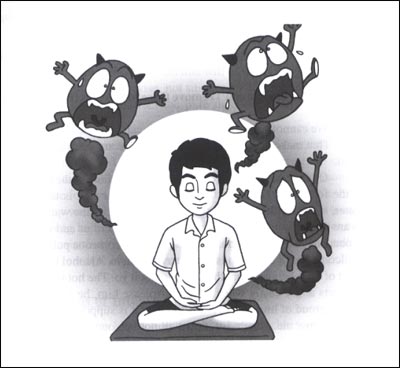The Practice of Austerities#2
Restraint of the senses
Restraint of the senses
Restraint of the senses is to be calm and take control over your mind and soul using your consciousness. How do you compose yourself? Let us focus on the following:
All of us have six channel by which we can improve or damage the quality of our minds and lives. There are six entrances to connect the mind with the outside world, they are as follows:
1. Eyes
2. Ears
3. Nose
4. Tongue
5. Skin
6. Mind
It is like a house with doors and windows that connect to the outside.
Humans are like the house with six gates that can absorb things from the outside. It is good if we can keep the mind calm and clear from these six gates. The six gates can also make the mind muddled or distracted. This is why the six gates are so important and that we should know the nature of them.
The Lord Buddha compared the sensory-doors to animals:
1. The eyes are like a snake. Snakes do not like flat places, they like hidden places. Like the eyes that do not like looking at flat things, but like looking at the gorgeous and complicated things especially hidden things. If it is published, not secret, then , the curiosity lessens.
2. The ears are like a crocodile. The ears like to hear flattery, cool or the flowery speech of others.
3. The nose is like a caged bird. The bird likes to fly through the air and find the source of any pleasant smell it detects.
4. The tongue is like a mad dog. The tongue likes tasting food especially delicious food every day. It is always looking for delicious food all day long. The more bizarre the food, the more it likes it.
5. The body is like a fix. It likes the warm and soft places. Cuddling on the lap of one person and later, cuddling on the lap of another. Snuggling with one person and later snuggling with another.
6. The mind is like a monkey. It likes to be mischievous and is always thinking of many things. Sometimes, thinking of the past, dreaming of castles in the sky, dreaming about the future. It will never stop thinking or resting.
We should restrain the senses by carefully safeguarding the six gates once we understand their nature. The consciousness can help safeguard them. Whatever you should not watch, you should not watch. Whatever should not be heard, you should not listen to. Whatever should not be smelled, you should not smell. Whatever should not be tasted, you should not listen to. Whatever should not be smelled, you should not smell. Whatever should not be tasted, you should not taste. Whatever should not be touched, you should not touch. Whatever should not be thought of, you should not think of. If you cannot avoid watching something and you’ve already looked at it, you should not get obsessed about it i.e.: he is very handsome or she is very beautiful. You must mot think of it as the whole body is gorgeous. You must not think too much about any part of body like that person has beautiful eyes, beautiful arms, or beautiful legs or anything like that.
The restraint of the senses is extremely important. It is the battle with the impurities by restraining your six senses that determines whether or not you will win or loose. If you have enough control over your senses, it is difficult for the defilements to attack you. The virtues that you intend to keep can be practiced for as long as you wish. It is like the house. Even though you don’t lock the drawers or the cabinets within the house, as long as you lock the doors and the windows firmly, it will be safe from the thief. But if you do not have control over your six senses such as watching what you should not watch, listening to what you should not be listening to, smelling what you should not smell, tasting what you should not be tasting, touching what you should not touch, Even though you intend to keep your precepts and morality indeed, we still have a chance to make a lot of mistakes. It is like the house without locking doors and windows. Even though, you lock the drawers and cabinets inside safely, it is still not safe because the thief can get into the house and steal your possessions.
The way to succeed in restraint of the senses is to practice inhibition or “Hiri-Ottappa” in pali. The word “Hiri” means you feel ashamed to make a sin. The word “Ottappa” means you are afraid to sin. By being respectful of ancestors, age, academics, institutes, etc. explained in blessing 19 will help you in practicing the inhibition or “hiri-ottappa”.
The Lord Buddha defined the chain of Dhamma as followa:
“Hiri-Ottappa” (inhibition) brings the restraint of the senses.
The restraint of the senses brings the precepts or self-discipline (Sila).
The precepts bring meditation (right concentration).
Meditation brings wisdom.
When the person restrains their senses completely, their precepts will be purified, their meditation will improve easily and firmly, their inner wisdom will arise as the brightness within them and they will see things in their true form and see the impurities hidden inside so they can destroy the impurities completely.
We all have to practice the restraint of the senses until it becomes part of us.
Meditation brings wisdom.
Commitment to Meditation
Most of us know what is good and want to bring the good to ourselves but it is rarely accomplished due to a lack of commitment. Without the commitment, the virtues cannot be fully realized.
“The person can overcome suffering through commitment.”
The Lord Buddha mentioned about the cause that make monks idle and the cause that make monks commit to meditation, which may bring some thoughts to us.
The cause of making monks idle
1. A monk knows that his task (or responsibility) exists but may be afraid of getting tired of doing it. So, he decides to rest to regain his energy. He does not make a commitment to meditate and enlighten the Dhamma that he never attains.
2. The monk’s task (or responsibility) is done and monk feels so tired that he sleeps and does not commit to meditation.
3. The monk knows the existence of the path but thinks that traveling is tiresome. So, he decides to sleep and keep his energy for traveling and does not commit to meditation.
4. The monk has traveled already but he feels tired, so he decides to sleep and does not commit to meditation.
5. The monk asks for alms and does not get as much food as he wants. He thinks getting too little food makes him weak and may not have good experience in meditation, so he decides to sleep without committing to meditation.
6. The monk asks for alms and gets a lot of food. He feels so full that he gains weight and is not commit to meditation.
7. The monk gets a little bit sick. He thinks he has enough reason to claim that he is afraid of getting sicker. So, he decides to sleep without committing to meditate.
8. The monk recovers from sickness. He feels that he has just recovered and does not have the energy to work. He feels that the sickness may return, so he decides to sloop and not commit to meditation.
The precepts bring meditation (right concentration).
The Cause of Commitment of Monks
1. A monk knows that his responsibility exists and he thinks it is not convenient to meditate while working. He still has some time now, so he commits himself to meditate to attain the Dhamma.
2. When the monk’s task is done, he thinks he cannot meditate well while he is working. Since he has already finished the job, he feels he has time and so he decides to meditate.
3. The monk knows the route that he needs to travel and he thinks it is not convenient to meditate while traveling. Because he has not traveled yet, he decides to start meditating at that time.
4. The monk has finished traveling and he thinks he cannot meditated well while traveling, so he decides to meditate right away after traveling.
5. The monk asks for alms and does not get much food as he thinks he needs. He thinks he ate so kittle today that it made him feel lighter and more comfortable at work. So, he decides to meditate immediately.
6. The monk asks for alms and gets a lot of food. He thinks he is full, so he decides to meditate while he has enough energy.
7. The monk gets a little sick. He thinks he may get sicker later and that he should meditate right away while he is only little bit sick.
8. The monk recovers from sickness. He feels that since he has just recovered and may get have a chance to be sick again, so he should spend this valuable time while is recovered to meditate.
We should use these principles to compare with ourselves to see where we are-idleness or commitment. Should we indulge in the six senses or try to improve them?
“Even though my own flesh and blood is dried out and there remains only skin, tendon and bone, as long as I do not attain the enlightenment that I can attain with my energy, commitment, and perseverance, I shall not stop meditating.” (The resolution of the Lord Buddha he made on his enlightening day.)
The Benefits of the restraint of the senses
1. Permanently relinquish self-indulgence
2. Brings all virtues inside
3. Brings all blessings inside
4. Enables to attain nirvana soon
Endurance is the resistance. It is the utmost austerity.
Meditation - Related Articles
" />
" />
" />
" />








